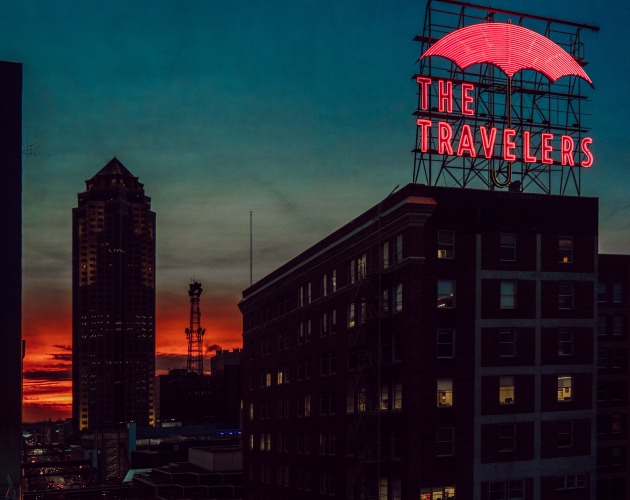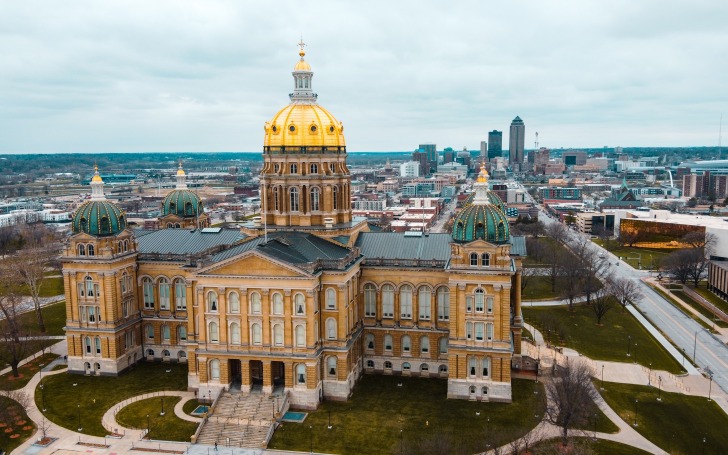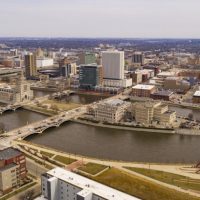The Hawkeye State has had inhabitants for over 8,000 years but it wasn’t until 1673 that French explorers came across it.
Less than 200 years later, Fort Des Moines was established.
Since then, the city has become the capital of Iowa and is currently home to 215,000 individuals.
The city has plenty of highlights, such as the cost of living and enjoyable people.
There’s also an extreme lack of diversity and poor education.
To figure out if this is the place for you, follow along as we take you through the best and worst of Des Moines, Iowa.

Contents
Pros of Living in Des Moines, IA
1. Cost of Living
If there’s anything most people want out of the place they call home, it’s affordability.
Des Moines is fortunate enough to have one of the most budget-friendly areas in the US.
A majority of locals are able to own a home because the average price for a home is $150,000.
Rent is also a popular option that is completely manageable.
Groceries, utilities, and other bills all come in under the national average.
2. Friendliness
Being in a place with as many advantages as Des Moines might make anyone want to smile at a neighbor or offer a helping hand when carrying groceries.
That’s the feeling you get from being downtown, anyway.
They are so nice that you might get confused and wonder if you’re in the south, a place that’s notable for hospitality.
Nope, just good, old-fashioned Iowans.
3. Wind Energy
Iowa has decided that it’s better to be ahead of the curve than wait until a disaster strikes to learn something.
So, the state has heavily invested in wind energy.
In Des Moines, over half of the power used in homes and businesses comes from wind turbines.
Being so flat can really come in handy and Iowa has decided to take full advantage.
4. Things to Do
Being the state capital is convenient when it comes to activities.
There are so many ways to stay entertained and busy here that we could go on and on.
Whatever it is you’re looking for, we’ve got it.
That includes things such as kid-friendly fun, outdoor adventures, museums, cultural events, and a plethora of tours.
Did we mention ziplining?
5. Traffic
Traveling to any capital or big city means long lines of cars.
No matter what you try to do, there’s construction, traffic, and never-ending misery on the road.
Des Moines has miraculously come out unscathed by this situation.
Of course, traffic jams happen.
But here, they clear out and the flow continues evenly.
Hard to complain about that.
6. Weather
If you’re a fan of more well-rounded seasons, Des Moines might be the place for you.
Yes, it does get cold and snowy in the winter and it gets hot in the summer.
However, the daily average in the winter is in the mid to high 30s.
The typical high in July is around 86 degrees.
Unlike places with extreme temperature variances, you do get all four seasons in Des Moines.
7. Job Opportunities
If you want a job in Des Moines, you’ve got it.
The job market here is quite healthy.
No one is really stuck at a company or in a job they don’t want.
There are so many places hiring for such a wide range of careers that employees are much more comfortable feeling out of their options.
The biggest industries are transportation, manufacturing, healthcare, teaching, and hospitality.
8. Nightlife
Much of Iowa’s population is spread out.
There are three million inhabitants across the state, which is the population of Chicago.
So, big cities and happening nightlife are few and far between.
However, since this is the capital, locals are in luck.
There are plenty of bars, jazz clubs, dance halls, and other places to enjoy the evening after sunset.
Cons of Living in Des Moines, IA
1. Taxes
No one wants to pay more taxes, but clearly, Des Moines didn’t get the notice.
Property taxes go 2% beyond the national average and sales tax is at 7%.
Considering the number of people moving out of state, perhaps that’s where the government is trying to reclaim lost funds.
Who can say for sure?
To be fair, they have employed a unique income tax plan.
Residents pay less out of their income than in neighboring states.
2. Diversity
The most diverse parts of most states are the capital cities.
It makes sense, there’s a lot going on and a lot of jobs.
That usually pulls people from all walks of life to live there.
Unfortunately, Iowa as a whole isn’t the most diverse place in the states.
Perhaps it’s the location, perhaps it’s the lack of activity, whatever it is, there could be an improvement.
The ethnic makeup of Des Moines is 65% European American, 14% Latin American, 12% African American, 7% Asian American, 1% Native American, and 1% Pacific Islander.
3. Education
The city and state are not putting enough tax dollars where they should go; our future.
Children are coming in well below the national average as far as testing is concerned.
Underfunded schools and lax standards are not helping the children.
Many parents opt for private education due to these embarrassing statistics.
4. Crime
Des Moines isn’t unique in having more crime as the capital.
Even though it’s listed as a con, the rates aren’t that high above the national average in both property and violent crimes.
Crime appears to increase with the economy.
When unemployment is higher, the rate at which crimes are committed tends to increase.
5. Low Income
Finding a job isn’t the problem in Des Moines, but getting one to pay a higher wage can be.
To help reduce the number of people leaving the area for higher-paying jobs, the city has employed a program that attracts anyone who works remotely to come and live there.
That way, they aren’t taking jobs from locals but they are spending money living there.
The hope is it will boost the economy.
It would have been nicer if they took a deep look at the budget and made some improvements.
But what do locals know?
6. Public Transportation
Most people imagine that the best public transportation is located in the capital for a number of reasons.
Whatever those reasons are, they haven’t been important enough to affect Des Moines.
It might be because most people who live here have the means to get themselves around.
Sadly, that is not a blanket privilege, as many suffer without vehicles.
Buses are hard to come by and there is no train or subway system in place.
To get around, you have to have access to a car.
7. Winter Storms
Yes, the weather was listed as a pro, but it should be noted just how harsh the cold can get.
While it’s not all season, the snow has gotten so bad before that everything comes to a halt.
When that happens, you have to cross your fingers and toes so that the power will stay on.
In the city, there’s a higher chance of getting it working again quicker than out in rural communities.
Also, Iowa is so flat that winter storms come through often, sweeping over the plains.
8. Lack of Professional Sports
Going to games and being invested in a sports team is what binds a population.
Unfortunately, those who live in Des Moines will never know what that’s like.
Iowa does not have any major sports teams.
Those massive, expensive stadiums in other capitals are just a fantasy for locals here.
That doesn’t mean there aren’t any sports at all, though.
Baseball, basketball, and hockey are all very popular in the minor leagues.

Pros and Cons of Living in Des Moines, IA – Summary Table
| Pros of Living in Des Moines, IA | Cons of Living in Des Moines, IA |
|---|---|
| 1. Cost of Living | 1. Taxes |
| 2. Friendliness | 2. Diversity |
| 3. Wind Energy | 3. Education |
| 4. Things to Do | 4. Crime |
| 5. Traffic | 5. Low Income |
| 6. Weather | 6. Public Transportation |
| 7. Job Opportunities | 7. Winter Storms |
| 8. Nightlife | 8. Lack of Professional Sports |
Des Moines Safety Overview
READ THE FULL REPORT: Des Moines Safety Review
Safety Index:
- OVERALL RISK: MEDIUM
- TRANSPORT & TAXIS RISK: LOW
- PICKPOCKETS RISK: MEDIUM
- NATURAL DISASTERS RISK: MEDIUM
- MUGGING RISK: MEDIUM
- TERRORISM RISK: LOW
- SCAMS RISK: LOW
- WOMEN TRAVELERS RISK: MEDIUM
Frequently Asked Questions
Is Des Moines LGBT+ friendly?
Several years before same-sex marriage was legalized by the United States Supreme Court, couples in this category had the freedom to marry.
Des Moines dug in deep to make everyone feel wanted and accepted.
The government employs members of the community, there is an LGBT task force, and a committee has been formed to deal with LGBT issues.
Who are notable people from Des Moines?
One of the most popular movie stars in the world right now was raised in Des Moines.
You might have heard of him.
His name is Jason Momoa.
Cloris Leachman, an actress with several decades of a career under her belt, is also from the area.
Tionne Watkins, one-third of one of the most successful girl groups in history, was born and raised here until she was nine.
Former president and actor, Ronald Regan kicked off his career as an announcer here.
Is the weather in Des Moines good for golf?
Depends on what time of year it is.
Surely, winter will be off-limits.
The rest of the year is up for grabs!
Golf is very much enjoyed by many residents.
In fact, Waveland Golf Course is the oldest municipal golf course west of the Mississippi River since it opened in 1901.
Where does the name Des Moines come from?
The Des Moines River inspired the name of the fort that was in operation here in the mid-1830s.
Des Moines River was named as such by the French colonists that had taken up residence in the area.
Moingona, meaning “of the monks,” was the closest French word to what they heard from the Native Americans.
So, it stuck and was eventually shortened to Moines.
What is the poverty rate in Des Moines?
Currently, 16% of the population is considered under the poverty line.
That number is determined by several factors.
Typically, for a person to fall into that category, everyone in the household is accounted for in comparison with the amount of money entering the home through employment.












The lack of diversity and poor education are concerning.
Des Moines, IA has a low cost of living and friendly people.